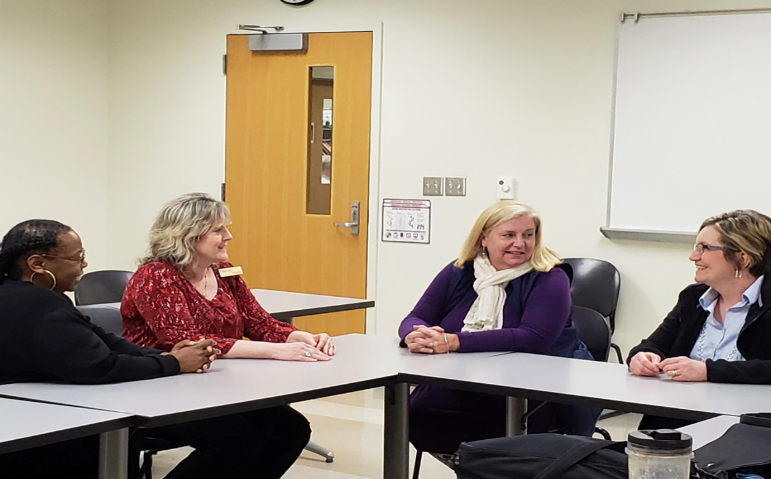EPIC Faculty Mentoring Roundtables Support Growth, Engagement, and Innovation

In literature, King Arthur is well-known as the originator of the round table. This table was a place for leaders to meet and discuss important topics. It created a space where each leader could easily see and hear the others and add to the conversation; at a round table, everyone was equal. Mentoring roundtables serve the same purpose, with a focus on mentors’ experiences mentoring new online faculty.
At Wake Technical Community College, a key component of the college’s quality enhancement plan—eLearning Preparedness Initiative across the College (EPIC)—is mentoring for new online faculty. The mentoring component, developed by a team of faculty, staff, and administrators, was fully implemented in fall 2017 and currently matches approximately 30 mentees per semester with 18 mentors from six core academic divisions.
Each mentor is EPIC 30 Online Certified: EPIC Mentor Certified by completing six hours of training in time management, goals setting, relationship building, and conflict resolution and EPIC Master Certified through the creation of an online course meeting EPIC Quality eLearning Standards. In addition, faculty mentors are supported by a mentoring coordinator who oversees the program and serves as on-call support.
Faculty mentors receive an EPIC Mentoring Handbook containing policies, procedures, forms, and resources used by mentors to support their mentees and to ensure confidentiality in the program. There is also a Blackboard class component, but the most innovative aspect of the program is the faculty mentoring roundtable.
EPIC Faculty Mentoring Roundtables
Mentoring is defined as a developmental, dynamic relationship (Schunk & Mullen, 2013). Functions of mentoring identified by Kram (1988) are career and psychosocial support, role modeling, and engagement, with engagement being key to innovation. The goal of faculty mentoring is to ensure a faculty member’s current and future success (Lechuga, 2014). Faculty mentoring roundtables serve this purpose by facilitating participant growth, support, engagement, and innovative thinking.
Wake Technical Community College created faculty mentoring roundtables based on King Arthur’s model. Although an actual round table is not used, a circle is formed and faculty mentors are situated so they can see other and the faculty mentoring coordinator, who facilitates the roundtable. The QEP Director also attends to contribute to discussions and ask questions to support program improvements.
Faculty mentoring circles provide a forum in which all members are equal and can teach and learn from each other’s mentoring experiences. They also serve as a reflective and learning exercise. While one mentor is sharing information with the group, other mentors are listening, reflecting, and learning. This approach is team-based, with no one person having more opportunity to contribute to the discussion or provide insight into mentoring than the others. It levels the mentoring leadership field and allows mentors to see themselves as vital to the circle, or community of mentors. “I don’t always have all the answers,” said Gregg Wallace, an associate professor of Web Technologies and part of the original EPIC mentoring team. “When I need a mentor, I go to the mentoring roundtable.”

From left to right: Margaret (Meg) Atkins, Assistant Professor, Business Administration; Denise H. Barton, Senior Professor, Business Administration, and EPIC Mentoring Coordinator; Debbie Maness, Associate Professor, English and EPIC mentoring team member; and Kim Faircloth, Assistant Professor, Office Administration.
Mentoring Climate
A climate of mentoring, in which inclusion, trust, engagement, reflection, and learning are present, serves as the cornerstone of the mentoring roundtable. Inclusion allows members to be authentic and promotes a sense of belonging (Shore, Randel, Chung, Dean, Holcomb, & Singh, 2011). Trust, a key requirement of the mentoring relationship, is defined as a willingness to be vulnerable to the actions of another with the expectation that the other will do what they say they will do (Mayer, Davis, & Schoorman, 1995). “Engagement is a positive, fulfilling, worker-related state of mind that is characterized by vigor, dedication, and absorption” (Schaufeli, Salanova, Gonzalez-Roma, & Bakker, 2002, p. 74). It is “being hyper-focused on the job task at hand, while experiencing feelings of enjoyment and self-fulfillment” (Barton, 2017, p. 60). Reflection is the process of thinking in order to assess and evaluate teaching practices for the purpose of development and improvement (Khan, 2014). Learning, in a mentoring scenario, refers to self-regulated behavioral, cognitive, metacognitive, and motivational learning (Zimmerman, 2001) and is a dynamic and cyclical process comprising feedback loops (Lord, Diefendorff, Schmidt, Hall, 2010). All of these elements are needed for mentors to grow and develop their expertise.
Mentoring skills are transferrable and adaptable to multiple teaching and learning modalities. For example, while the mentoring program at Wake Tech is currently focused on online instruction, faculty mentors are trained to support standards that translate to hybrid and in-person environments. Faculty mentoring roundtables provide a mechanism to advance excellence in teaching through course design and the development of the knowledge, skills, and abilities of other faculty members. Mentoring at the college has evolved from new faculty career and psychosocial support to include an engagement strategy targeted at retaining and developing both mentors and mentees. Engagement is linked to competitive advantage, performance, retention and attendance, and loyalty (Kusuma & Sukanya, 2013); engagement through mentoring is vital to organizational development. In higher education, retention, development, and engagement of faculty, staff, and administrators are key components of performance needed for excellence in teaching and learning.
A mentoring climate takes time, effort, and in-place systems to support it; the faculty mentoring roundtable serves as a format that makes visible the inner workings and results of this climate and the benefits to its members. In fact, the mentoring roundtable concept can be implemented for any mentoring scenario, such as student or faculty peer mentoring, student-alumni mentoring, and staff mentoring. It is different from group mentoring, where one individual gains support from a group; instead, it is interactive, engaging, and focused on supporting all participants equally, thus creating a sense of community, equality, and camaraderie among members.
Key Elements Supported by Faculty Mentoring Roundtables
EPIC faculty mentoring roundtables support the growth and engagement of mentors as well as innovation. With the exchange of knowledge and original thoughts, mentors experience growth in knowledge, skills, and abilities. They learn more about themselves, how other mentors manage mentoring relationships and program goals, and how to resolve unique situations that may occur when mentoring new online faculty. They engage with each other and learn new ways to engage their mentees. They learn more about how the college operates, and their engagement in the college mission increases.
According to a 2018 Gallup employee engagement survey, 34 percent of employees report that they are engaged at work (Harter, 2018). Engagement is clearly aligned with innovation in a trusting environment (Agarwal, 2014). Mentoring roundtables are open forums where all mentors are invited to discuss their mentoring experiences. Through inclusion and engagement of mentors, innovative thinking occurs. Faculty mentors create new and different strategies to communicate with their mentees, to overcome mentee resistance, and to align organization and design of online classes with quality teaching.
Best Practice for Mentoring in Higher Education
A mentoring roundtable embedded in a climate of mentoring is a best practice example for mentoring in higher education. It allows all mentors to be equally involved and to contribute to their own and others’ learning through reflection. It establishes trusting relationships and gives mentors dedicated time to listen to other mentors or role models. It also allows vulnerability to become an asset when mentors request assistance or insight, thus providing learning opportunities for all those participating. Mentors feel at ease discussing their experiences, good and bad, without fear of disclosure or discussion outside of the mentoring roundtable. This reinforces the trust required in a mentoring climate and enhances the engagement of all mentors in support of each other. Reflection and learning occur as a continuous process of improvement, helping mentors gain valuable insight into ways they can better serve their mentees and the college’s goals of teaching excellence.
Lori Frear, an EPIC Master Mentor and biology professor, earned the 2018 Award for Excellence in eLearning, Outstanding eCourse, from the Instructional Technology Council, an affiliated council of the American Association of Community Colleges. According to Lori,
Mentoring other faculty has resulted in a deep sense of personal satisfaction and purpose. After becoming a mentor, I felt that I added value to my fellow faculty members by sharing my experiences, my successes, my failures, and by supporting my fellow faculty in developing and implementing quality online courses. Mentoring has allowed me to expand the method by which I ensure student success; now I can help students not only in my classes, but in other faculty member’s classes, to succeed in their academic path.
References
Agarwal, U. A. (2014). Linking justice, trust and innovative work behaviors to work engagement. Personnel Review, 43(1), 41-73. doi:10.1108/PR-02-201200019
Barton, D. H. (2017). Effect of inclusive climate on worker engagement and turnover intentions for female technology workers (Doctoral dissertation). (ProQuest Order No. 10642030).
Harter, J. (2018, August 26). Employee engagement on the rise in the U. S. Gallup. Retrieved from news.gallup.com/poll/241649/employee-engagement-rise.aspx
Khan, M. I. (2014). Reflection in initial teacher education: Case for a comprehensive framework. FWU Journal of Social Sciences, 8(2), 8-15.
Kram, K. E. (1998). Mentoring at work: Developmental relationships in organizational life. London: University Press of America.
Kusuma, P. G., & Sukanya, M. (2013). Research synthesis on employee engagement strategies. International Journal of Organizational Behaviour & Management Perspectives, 2(4), 661–667.
Lechuga, V. M. (2014). A motivation perspective on faculty mentoring: The notion of "non-intrusive" mentoring practices in science and engineering. Higher Education, 68(6), 909-926. http://dx.doi.org/10.1007/s10734-014-9751-z
Lord, R. G., Diefendorff, J. M., Schmidt, A. M., & Hall, R. J. (2010). Self-regulation at work. Annual Review of Psychology, 61, 543–568.
Mayer, R. C., Davis, J. H., & Schoorman, F. D. (1995), An integrative model of trust formation, Academy of Management Review, 20(3), 709-734.
Shore, L. M., Randel, A. E., Chung, B. G., Dean, M. A., Holcomb Ehrhart, K., & Singh, G. (2011). Inclusion and diversity in work groups. A review and model for future research. Journal of Management, 37(4), 1261-1289. doi: 10.1177/0149206310385943
Schaufeli, W. B., Salanove, M., Gonzalez-Roma, V., & Bakker, A. B. (2002). Utrecht work engagement scale-17. Psyctest, doi:10.1037/t07164-000
Schunk, D., & Mullen, C. (2013). Toward a conceptual model of mentoring research: Integration with self-regulated learning. Educational Psychology Review, 25(3). 361-389.
Zimmerman, B. J. (2001). Theories of self-regulated learning and academic achievement: an overview. In B. J. Zimmerman & D. H. Schunk (Eds.), Self-regulated learning and academic achievement: Theoretical perspectives (2nd ed., pp. 1-37). Mahwah, NJ: Lawrence Erlbaum Associates.
Denise H. Barton, PhD, SHRM-SCP, SPHR is a senior professor of Business Administration and the EPIC Mentoring coordinator at Wake Technical Community College in Raleigh, North Carolina.
Opinions expressed in Innovation Showcase are those of the author(s) and do not necessarily reflect those of the League for Innovation in the Community College.










